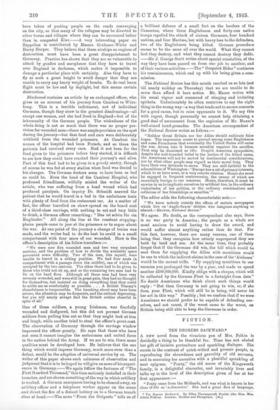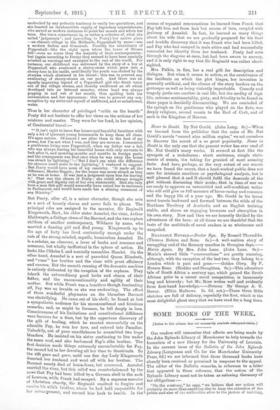FICTION.
TEN DEGREES BACKWARD.*
A NEW novel from the vivacious pen of Mrs. Felkin is decidedly a thing to be thankful for. Time has not abated her gift of incisive portraiture and sparkling dialogue. She excels in the contrast of quick-wilted and prosaic people, in reproducing the shrewdness and garrulity of old servants, and in seasoning her narrative with a plentiful sprinkling of neat epigram. "Ponty," the old nurse of the Kingsworth family, is a delightful character, and invariably lives and talks up to the level of the description given of her at her first appearance :— " Ponty came from the Midlands, and was what is known in her class of life as ' a character.' She had a great flow of language, • Ten Delirium Backward. By Ellen Thorneyoroft Fowler (the Hon. Mrs. Alfred Felkini. Loudon: Hodder and Stoughton. Las.]
unchecked by any pedantic tendency to verify her quotations, and she boasted an inexhaustible supply of legendary acquaintances, who served as modern instances to point her morals and adorn her tales. She wasp, connoisseur in, or rather a collector of, what she called judgments '; and (according to Ponty) her native place —an obscure village in the Midlands, Poppenhall by name—was a modern Sodom and Gomorrah. Possibly the inhabitants of Poppenhall—liko the eight upon whom the tower of Siloam fell—were no worse than the majority of their contemporaries : but (again according to Polity) they seemed to have been specially selected as warnings and examples to the rest of the world. For instance, our childhood was enlivened by the story of a boy at Poppenhall who swallowed a cherry-stone which grew into a cherry-tree in his inside, until finally the youth was choked by the cherries which clustered in his throat : this was to prevent any swallowing of cherry-stones on our part. And there was an equally improving legend of a Poppenhall girl who drank water out of the village stream, and thereby swallowed an eft which developed into an internal monster, whose head was always popping in and out of her mouth, thus spoiling both her conversation and her appearance : this was to prevent any con- sumption by my sister and myself of unfiltered, and so unhallowed, water.
Thus in her character of privileged "critic on the hearth ". Ponty did not hesitate to offer her views on the actions of her mistress and master. They were far too fond, in her opinion, of Continental travel :— "' It isn't right to leave fine houses and beautiful furniture with only a lot of ignorant young housemaids to keep them all clean. We agen nature. Of course I sea after them to the beet of my power, but I'm not what I was, and they are more so. I remember a gentleman living near Poppenhall, when my father was a lad, who was always leaving his beautiful house with only servants to look after it, and spending months and months in foreign parts, and the consequence was that once when he was away the house
was struck bylightning But I don't see what the difference his absence could make to the lightning,' I ventured to suggest. But Ponty would have none of my casuistry. ' It made all the difference, Master Reggie ; for the house was never struck as long as ho was at home. It was just a judgment upon him for leaving it.' That was the charm of Panty she could always wriggle with grace and dignity out of her own statements. Had she only been a man this gift would assuredly have raised her to eminence in Parliament, and would have made her a shining ornament of any Ministry."
But Ponty, after all, is a minor character, though she acts as a sort of homely chorus and never fails to please. The principal roles are assigned to the narrator, Sir Reginald Kingeworth, Bart., his elder sister Annabel, the vicar, Arthur Blathwayte, a College chum of the Baronet, and the two orphan children of another contemporary, Wildacre by name, who married a dancing girl and died young. Kingsworth up to the age of forty has lived contentedly enough under the . rule of the strong-minded, capable, humourless Annabel. He is a scholar, an observer, a lover of books and romance and nonsense, but wholly ineffectual in the sphere of action. He looks like Chisrlee I. and mentally resembles Hamlet. On the other hand, Annabel is a sort of parochial Queen Elizabeth, and " runs " her brother and the vicar with great efficiency and success. But the smooth running of the domestic machine is entirely dislocated by the irruption of the orphans. They inherit the extraordinary good looks and charm of their father, and the unconventionality and agility of their mother. But while Frank was a heartless though, fascinating elf, Fay was as lovable as she was enchanting. The effect of these „wonderful playmates on the blameless Baronet was electrifying. He came out of his shell; be found at last a sympathetic audience for his unconventional and frivolous remarks ; and, as might be foreseen, he fell deeply in love. Consciousness of his limitations and constitutional diffidence were barriers for a time, but by the opportune discovery of the gift of healing, which he exerted successfully on the adorable Fay, he won her love, and entered into Paradise. Unluckily, out of pure unselfishness he committed two huge blunders. He insisted on his sister continuing to live under the same roof, and also harboured Fay's elfin brother. The first decision made things extremely uncomfortable for Fay, the second led to her devoting all her time to theatricals. So the rift grew and grew, until one fine day Lady Kingsworth deserted her husband and went off with her brother. The Baronet nearly died of brain-fever, but recovered. Annabel married the vicar, but this relief was counterbalanced by the news that Pay had been killed by a German shell in the sack of Louvain, while Frank had escaped. By a supreme exercise of Chrietian charity, Sir Reginald resolved to forgive and. receive his wife's brother, -whom lie bad held responsible for her eetrangement, and nursed him back to health. In the• course of repeated conversations he learned from Frank that Fay left him not from lack but excess of love, coupled with jealousy of Annabel. In fact, he learned so many things about his wife that we are gradually prepared for his final and beatific discovery that it was Frank who had been killed, and Fay who had escaped in male attire and had successfully concealed her identity from her husband. Ponty had seen through the disguise at once, but had been sworn to secrecy, and it is only right to say that Sir Reginald was rather short- sighted.
Mrs. Felkin, in fine, has a real gift for description and dialogue. But when it comes to action, or the contrivance of the incidents on which the plot hinges, her invention is generally artificial, and the climax of the story borders on the grotesque as well as being violently improbable. Comedy and tragedy jostle one another in real life, but the medley of high life, extreme sentimentality, piety, and frivolity to be found in these pages is decidedly disconcerting. We are reminded of the epitaph on the gentleman who played on the flute, was deeply religious, second cousin to the Earl of Cork, and of such is the Kingdom of Heaven.



































 Previous page
Previous page